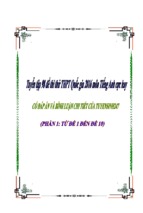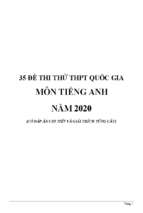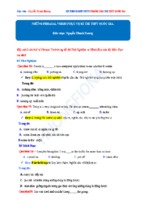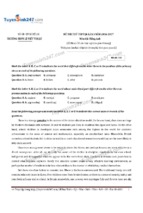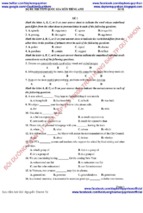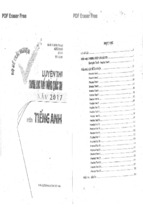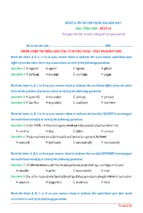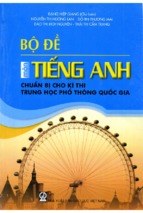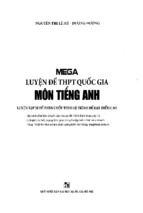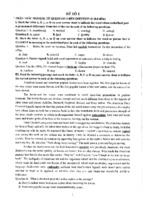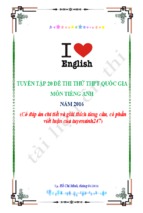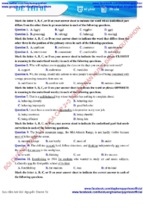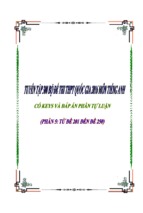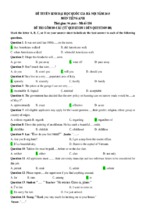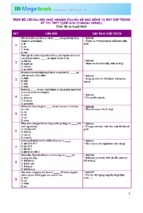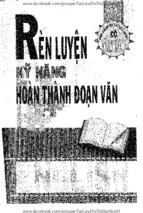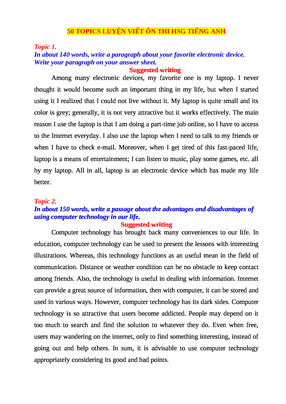TUYỂN TẬP ĐỀ THI – CÂU HỎI ÔN THI MÔN TIẾNG ANH
TUYỂN TẬP ĐỀ
THI – CÂU HỎI ÔN
THI MÔN TIẾNG
ANH
NĂM 2018
Trường THPT Tân Yên số 2
-------------------
Đề thi thử THPT Quốc gia năm học 2014-2015
Môn: Tiếng Anh – Lớp 12
Thời gian làm bài: 90 phút
Mã đề thi 245
Họ, tên thí sinh:..........................................................................
Số báo danh:...............................................................................
I/ ( ID: 87743 ) Mark the letter A, B, C, or D on your answer sheet
differs from the rest in the position of the main stress.
Câu 1:
A. deforestation
B. endangerment
C. capacity
Câu 2:
A. wonderful
B. government
C. temptation
Câu 3:
A. development
B. performance
C. appearance
to indicate the word that
D. priority
D. beautiful
D. telephone
II/ ( ID: 87747 ) Mark the letter A, B, C, or D on your answer sheet to indicate the word whose
underline is pronounced differently from the rest.
Câu 4:
A. unit
B. uniform
C. umbrella
D. unique
Câu 5:
A. near
B. hear
C. dear
D. bear
Câu 6:
A. why
B. when
C. which
D. who
Câu 7:
A. stopped
B. arrived
C. laughed
D. looked
Câu 8:
A. photographs
B. thinks
C. pens
D. sits
III/ ( ID: 87753 ) Read the following passage and mark the letter A, B, C, or D on your answer
sheet to indicate the correct answer to each of the following questions.
The three phases of the human memory are the sensory memory, the short-term memory, and the
long-term memory. This division of the memory into phases is based on the length of time of the
memory.
Sensory memory is instantaneous memory. It is an image or memory that enters your mind only
for a short period of time; it comes and goes in under a second. The memory will not last longer than
that unless the information enters the short-term memory.
Information can be held in the short-term memory for about twenty seconds or as long as you are
actively using it. If you repeat a fact to yourself, that fact will stay in your short-term memory as long
as you keep repeating it. Once you stop repeating it, either it is forgotten or it moves into long term
memory.
Long-term memory is the huge memory tank that can hold ideas and images for years and years.
Information can be added to your long-term memory when you actively try to put it there through
memorization or when an idea or image enters your mind on its own.
Câu 9: The best title for this passage would be ______.
A. Human Phases
B. The Difference between Sensory and Short-Term Memory
C. The Stages of Human Memory
D. How Long It Takes to Memorize
Câu 10: The three phases of memory discussed in this passage are differentiated according to
______.
A. how the senses are involved in the memory
B. the location in the brain
C. the period of time it takes to remember something
D. how long the memory lasts
Câu 11: The expression “is based on” in the first paragraph could best be replaced by ______.
A. depends on
B. is at the foot of
C. is on top of
D. is below
>> Truy cập http://tuyensinh247.com/ để học Toán – Lý – Hóa – Sinh – Văn – Anh tốt nhất!
1/10
Câu 12: According to the passage, which type of memory is the shortest?
A. Sensory memory
B. Active memory
C. Short-term memory
D. Long-term memory
Câu 13: According to the passage, when will information stay in your short-term memory?
A. For as long as twenty minutes.
B. As long as it is being used.
C. After you have repeated it many times.
D. When it has moved into long-term memory.
Câu 14: The word “keep” in the third paragraph could best be replaced by ______.
A. save
B. hold
C. retain
D. continue
Câu 15: The word “Once” in the third paragraph could best be replaced by which of the following?
A. Because
B. Although
C. Just before
D. Just after
Câu 16: All of the following are true about long-term memory EXCEPT that ______.
A. it has a very large capacity
B. memorization is the only way that information can get there
C. it can hold information for a long time
D. it is possible to put information into it through memorization
Câu 17: The expression “on its own” in the last paragraph could best be replaced by ______.
A. in its own time
B. by itself
C. with its possessions
D. in only one way
Câu 18: It can be inferred from the passage that, if a person remembers a piece of information for
two days, this information is probably in ______.
A. three phases of memory
B. the long-term memory
C. the sensory memory
D. the short-term memory
IV/ ( ID: 87764 ) Read the following passage and mark the letter A, B, C, or D on your answer
sheet to indicate the correct answer to each of the following questions.
Telecommunicating is a form of computer communication between employees‟ homes and offices.
For employees whose jobs involve sitting at a terminal or word processor entering data or typing
reports, the location of the computer is of no consequence. If the machine can communicate over
telephone lines, when the work is completed, employees can dial the office computer from a distant
site and transmit the material to their employers. A recent survey in USA Today estimates that there
are approximately 8.7 million telecommuters. But although the numbers are rising annually, the trend
does not appear to be as significant as predicted when Business Week published "The Portable
Executive" as its cover story a few years ago. Why hasn't telecommuting become more popular?
Clearly, change simply takes time. But in addition, there has been active resistance on the part of
many managers. These executives claim that supervising the telecommuters in a large work force
scattered across the country would be too difficult, or, at least, systems for managing them are not yet
developed, thereby complicating the manager's responsibilities.
It is also true that employees who are given the option of telecommuting are often reluctant to accept
the opportunity. Most people feel that they need regular interaction with a group, and many are concerned
that they will not have the same consideration for advancement if they are not more visible in the
office setting. Some people feel that even when a space in their homes is set aside as a work area,
they never really get away from the office.
Câu 19: The author mentions all of the following as concerns of telecommuters EXCEPT___
A. the opportunities for advancement
B. the lack of interaction with a group
C. the different system of supervision
D. the fact that the work space is in the home
Câu 20: The word "resistance" could best be replaced by_______.
A. consideration
B. alteration
C. opposition
D. participation
Câu 21: How many American workers are involved in telecommuting?
A. More than 8 million
B. More than predicted in Business Week
C. Fewer than last year
D. Fewer than estimated in USA Today
Câu 22: It can be inferred from the passage that the author is _______.
A. the manager of a group of telecommuters
B. a reporter
>> Truy cập http://tuyensinh247.com/ để học Toán – Lý – Hóa – Sinh – Văn – Anh tốt nhất!
2/10
C. a telecommuter
D. a statistician
V/ ( ID: 87769 ) Mark the letter A, B, C, or D on your answer sheet to indicate the one that best
completes each sentence.
Câu 23: I don‟t think you are telling ______ lie.
A. Φ
B. the
C. a
D. an
Câu 24: She asked her nephew: “Can you guess what I bought for you?”
A. She asked her nephew to buy something for her.
B. She asked her nephew if he could guess what he could buy.
C. She asked her nephew if he could guess what she had bought for him.
D. She asked her nephew if he can guess what she had bought for him.
Câu 25: This room is ____________________ .
A. such small room that we can‟t work in it
B. so small that we can‟t work in
C. not big enough for us to work in it
D. too small for us to work in
Câu 26: It is believed that the man escaped in a stolen car.
A. The man was believed to be escaped in a stolen car.
B. The man is believed to be escaped in a stolen car.
C. They believed that the man stole the car.
D. The man is believed to have escaped in a stolen car.
Câu 27: Having been selected to represent the Association of American Engineers at the
International Convention, __________.
A. the members congratulated him
B. the members applauded him
C. a speech had to be given by him
D. he gave a short acceptance speech
VI/ ( ID: 87775 ) Mark the letter A, B, C, or D on your answer sheet to indicate the correct
answer to each of the following questions.
Câu 28: Tom. "I'm sorry. I won't be able to come". - Mary. “_______”.
A. Oh, that's annoying B. Great
C. Sounds like fun
D. Well, never mind
Câu 29: I really wanted to go to the wedding party, but _______.
A. I'm not invited
B. I was not invited
C. I will not be invited
D. I have not been invited
Câu 30: We can _______ not only through words but also through body language.
A. speak
B. talk
C. communicate
D. interpret
Câu 31: I ________ my former teacher for over 10 years..
A. won‟t see
B. didn‟t see
C. haven‟t seen
D. don‟t see
Câu 32: _______ non-verbal language is _______ important aspect of interpersonal communication.
A. The/a
B. /an
C. A/ the
D. the/
Câu 33: The policeman_______ him to appear as a witness.
A. made
B. advised
C. let
D. saw
Câu 34: _______ the bad weather, we didn‟t cancel the match.
A. Despite
B. Although
C. Because of
D. Because
Câu 35: I understand your point of view. _________, I don‟t agree with you.
A. Moreover
B. Therefore
C. But
D. However
Câu 36: To solve this problem, it is advisable _______ .
A. that to adopt a drastic measure
B. a drastic measure to be adopted
C. that a drastic measure be adopted
D. that a drastic measure is adopted
Câu 37: __________ to the party, they could hardly refuse to go.
A. Being invited
B. Having been invited
C. To have invited
D. Have invited
Câu 38: ________ Chrismas Eve, people often have parties late at midnight.
A. In
B. On
C. At
D. From
>> Truy cập http://tuyensinh247.com/ để học Toán – Lý – Hóa – Sinh – Văn – Anh tốt nhất!
3/10
Câu 39: George wouldn't have met Mary_______ to his brother's graduation party.
A. if he has not gone
B. had he not gone
C. if he shouldn't have gone
D. hadn't he gone
Câu 40: They don‟t allow _________ in this museum.
A. photographs taking
B. to take photographs
C. photographs to take
D. taking photographs
Câu 41: The boy _____ family is poor is very intelligent.
A. which
B. whose
C. whom
D. who
Câu 42: If people drove more carefully, there _________ fewer accidents.
A. would have been
B. would be
C. will be
D. would been
Câu 43: The thieft denied __________ my camera.
A. taken
B. to take
C. take
D. taking
Câu 44: Never before __________ such a beautiful waterfall.
A. that I have seen
B. I have seen
C. do I see
D. have I seen
Câu 45: He had a portrait ________ as a birthday present for his daughter.
A. paint
B. painting
C. painted
D. to be painted
Câu 46: My dog as well as my cats _______ twice a day.
A. have eaten
B. eat
C. eats
D. has eaten
Câu 47: My sister refuses ______ me with my homework.
A. help
B. helping
C. helped
D. to help
Câu 48: You said she was going away the next Sunday,_______ ?
A. didn't you
B. didn't I
C. wasn't she
D. wasn't it
Câu 49: The bomb _______ with a loud bang which could be heard all over the town.
A. went up
B. went down
C. went off
D. went on
Câu 50: John. “What a beautiful shirt you have!”
Laura. “_______ ”.
A. Of course not.
B. It isn‟t beautiful.
C. Thanks. That‟s a nice complement.
D. Well, that's very surprising
Câu 51: Jane wasn't in when I arrived. I suppose she _______ I was coming.
A. may forget
B. can't have forgotten
C. must have forgotten
D. must forget
Câu 52: Jane. “Do you think it's going to rain”.
Mary. “_______”.
A. I don't hope so
B. I don't hope either C. I hope not
D. I hope not so
Câu 53: Eating and living in this country are becoming ___________ expensive.
A. less
B. too
C. more and more
D. so
Câu 54: If you had taken my advice, you _______ in such difficulties now.
A. hadn't been
B. wouldn't be
C. won't be
D. wouldn't have been
Câu 55: One's fingerprints are _______ other person.
A. different from those of any
B. different from
C. differ from any
D. different from any
Câu 56: _______ does it take you to go to school? - About half an hour
A. How far
B. How much
C. How long
D. How often
Câu 57: You can ________ the new words in the dictionary.
A. look for
B. look up
C. look at
D. look after
Câu 58: Don‟t be concerned about your mother‟s illness; she‟ll recover soon.
A. angry with
B. surprised at
C. embarrassed at
D. worried about
Câu 59: On _______ he had won the first prize, he jumped for joy.
A. having
B. being told
C. telling
D. he was told
Câu 60: _______, we tried our best to complete it.
A. Difficult as the homework was
B. Thanks to the difficult homework
>> Truy cập http://tuyensinh247.com/ để học Toán – Lý – Hóa – Sinh – Văn – Anh tốt nhất!
4/10
C. As though the homework was difficult
D. Despite the homework was difficult
Câu 61: In most_______ developed countries, up to 50% of_______ population enters higher
education at some time in their lives.
A. /
B. /the
C. the/ a
D. the/
Câu 62: John: “Would you like to eat out now?” Mary: “________”
A. I‟d prefer not
B. Yes, please
C. No, thanks
D. Yes, I‟d love to
VII/ ( ID: 87811 ) Mark the letter A, B, C, or D on your answer sheet to choose the sentence
which is closest in meaning to the given one.
Câu 63: You should have persuaded him to change his mind.
A. You should persuade him to change his mind.
B. You didn't persuade him to change because of his mind.
C. It was essential to persuade him to change his mind but you didn‟t.
D. You persuaded him to change his mind but he didn't listen.
Câu 64: “You're always making terrible mistakes”, said the teacher.
A. The teacher realized that his students always made terrible mistakes.
B. The teacher complained about his students making terrible mistakes.
C. The teacher asked his students why they always made terrible mistakes.
D. The teacher made his students not always make terrible mistakes.
Câu 65: When the unemployment rate is high, the crime rate is usually also high.
A. The higher the unemployment rate is, the higher the crime rate is.
B. The high rate of unemployment depends on the high rate of crime.
C. The unemployment rate and the crime rate are both higher.
D. The unemployment rate is as high as the crime rate.
Câu 66: „Don‟t touch that flower”, the old lady said to the boy.
A. The old lady warned the boy not to touch that flower.
B. The old lady warned the boy to touch that flower
C. The old lady insisted the boy on to touch that flower.
D. The old lady wanted the boy to touch that flower.
Câu 67: When we arrived at the airport, __________.
A. the plane takes off
B. the plane will take off
C. the plane has already taken off
D. the plane had already taken off
VIII/ ( ID: 87817 ) Read the following passage and mark the letter A, B, C, or D on your answer
sheet to indicate the correct word for each of the blanks.
Today there are libraries in almost every towns in the world. Even in areas (68) ______ there are
no libraries, there are often mobile libraries which take books from one village to (69)______. But in
the days when books were copied by hand (70)______ than printed, libraries were very rare. The
reason is simple: books took a very long time to produce, and there were far fewer copies of any
given work around. The greatest library (71)______ all, that in Alexandia had 54,000 books.
In the ancient world, this number (72)______ considered huge. It was the first time that anyone
had collected so many books from all around the world (73)______ one roof. There are many theories
about why these books were lost. (74)______is that the library accidentally burned down. Another is
that one of the rulers of the city ordered the books to be burned. They were taken to various places
and it took six months to burn them. (75)______ happened, the collection there was priceless. Many
of the library‟s treasures were lost forever, some books were never recovered. We cannot even know
exactly what the library contained.
Câu 68: A. where
B. who
C. the place
D. which
Câu 69: A. other
B. others
C. the other
D. another
Câu 70: A. rather
B. else
C. more
D. much
Câu 71: A. of
B. about
C. in
D. over
Câu 72: A. is
B. was
C. were place
D. has been
>> Truy cập http://tuyensinh247.com/ để học Toán – Lý – Hóa – Sinh – Văn – Anh tốt nhất!
5/10
Câu 73: A. in
B. under
C. over
D. below
Câu 74: A. One
B. A theory
C. None
D. All
Câu 75: A. Whoever
B. Whichever
C. Whatever
D. Wherever
IX/ ( ID: 87826 ) Mark the letter A, B, C, or D on your answer sheet to show the underlined
part that needs correction.
Câu 76: He is enough strong to carry the heavy luggage.
A
B
C
D
Câu 77: You are always driving your car such fast that you often cause accidents.
A
B
C
D
Câu 78: Seldom did her classmates and she go on a picnic with together.
A
B
C
D
Câu 79: It is the writing English that causes difficulties to foreigners.
A
B
C
D
Câu 80: It is rude to laugh on our friends.
A B
C D
-----------------------------------------------
----------- HẾT ----------
>> Truy cập http://tuyensinh247.com/ để học Toán – Lý – Hóa – Sinh – Văn – Anh tốt nhất!
6/10
Lời giải chi tiết
Đề thi thử Tiếng Anh trường THPT Tân Yên số 2
I/
1. Đáp án là A. Từ deforestation có trọng âm rơi vào âm tiết thứ tư, các từ còn lại có trọng âm rơi vào
âm tiết thứ hai.
2. Đáp án là C. Từ temptation có trọng âm rơi vào âm tiết thứ hai, các từ còn lại có trọng âm rơi vào
âm tiết thứ nhất.
3. Đáp án là D. Từ telephone có trọng âm âm rơi vào âm tiết thứ nhất, các từ còn lại có trọng âm rơi
vào âm tiết thứ hai.
II/
4. Đáp án là C. Từ umbrella có phần gạch chân được phát âm là /ʌ/, các từ còn lại có phần gạch chân
được phát âm là /ju:/
5. Đáp án là D. Từ bear có phần gạch chân được phát âm là /eə/, các từ còn lại có phần gạch chân
được phát âm là /iə/
6. Đáp án là D. Từ who có phần gạch chân được phát âm là /h/, các từ còn lại có phần gạch chân
được phát âm là /w/
7. Đáp án là B. Theo quy tắc đọc đuôi –ed, từ arrived có phần gạch chân được phát âm là /d/, các từ
còn lại có phần gạch chân được phát âm là /t/
8. Đáp án là C. Theo quy tắc đọc đuôi –s/-es, từ pens có phần gạch chân được phát âm là /z/, các từ
còn lại có phần gạch chân được phát âm là /s/
III/
9. Đáp án là C. Dựa vào câu đầu tiên của bài: The three phases of the human memory are the
sensory memory, the short-term memory, and the long-term memory.
10. Đáp án là D. Dựa vào ý: This division of the memory into phases is based on the length of time
of the memory.
11. Đáp án là A. is based on = depends on : dựa vào …
12. Đáp án là A. Dựa vào ý: …. only for a short period of time; it comes and goes in under a
second. Còn C loại vì “…. about twenty seconds or as long as you are actively using it” , D loại vì “
…. for years and years”
13. Đáp án là B. Dựa vào ý : Information can be held in the short-term memory for about twenty
seconds or as long as you are actively using it.
14. Đáp án là D. keep = continue: tiếp tục
15. Đáp án là D : Once = Just after: sau khi
16. Đáp án đúng là B.
A được đề cập: … that can hold ideas and images for years and years
C được đề cập: .. Information can be added to your long-term memory…
D được đề cập: …. you actively try to put it there through memorization….
17. Đáp án là B. on its own = by itself: tự nó
18. Đáp án là B. Vì “ sensory memory” và “short-term memory”, thông tin được lưu giữ chỉ được
tính theo giây => long term memory là đáp án đúng
IV/
19. A được đề cập: It is also true that employees who are given the option of telecommuting are often
reluctant to accept the opportunity.
>> Truy cập http://tuyensinh247.com/ để học Toán – Lý – Hóa – Sinh – Văn – Anh tốt nhất!
7/10
B được đề cập : Most people feel that they need regular interaction with a group, and many are
concerned that they will not have the same consideration for advancement if they are not more visible
in the office setting.
D được đề cập: Some people feel that even when a space in their homes is set aside as a work area,
they never really get away from the office.
=> Đáp án là C.
20. Đáp án là C. resistance = opposition : sự chống cự, kháng cự
Nghĩa các từ còn lại: consideration: sự cân nhắc; alteration: sự thay đổi; participation: sự tham gia
21. Đáp án là A. Ý trong bài: A recent survey in USA Today estimates that there are approximately
8.7 million telecommuters.
22. Đáp án là B. Có thể dựa vào ý chính trong bài => đây là một bản báo cáo, thông báo về
“telecommunicating”
V/
23. Đáp án là C. tell a lie: nói dối
24. Đáp án là C. Khi biến đổi câu hỏi đảo từ trực tiếp sang gián tiếp,ta thêm “if” sau đó biến đổi câu
hỏi đảo thành dạng tường thuật. Thêm vào đó, ta phải đổi ngôi và thì của động từ: you => he ( theo
tân ngữ “her nephew” ); I => she ( theo chủ ngữ “she” ); can guess => could guess; bought => had
bought
25. Đáp án là D. Dùng phương pháp loại trừ: A loại vì thiếu mạo từ “a” trước “small room”. B loại vì
thiếu từ “it = this room” sau giới từ “in”; C loại vì trật tự sai “ enough big”
26. Đáp án là D. Cấu trúc chủ động, bị động câu hai mệnh đề:
People/ Someone + V1(ý kiến) + that + S2 + V(2) + …
=> It + be+ V-ed(ý kiến) + S2 + V(2) + … hoặc S2 + be+ V-ed(ý kiến) + to + V2 + ….
Chú ý: Nếu muốn nhấn mạnh V2 đã xảy ra trong quá khứ, ta có thể dùng : V2 = have done
27. Đáp án là D. Hai mệnh đề trong câu phải đồng chủ ngữ khi có một mệnh đề bị giản lược chủ ngữ.
VI/
28. Câu này hỏi về kỹ năng giao tiếp.
I'm sorry. I won't be able to come. – Đây là một lời xin lỗi.
Để đáp lại lời xin lỗi của người khác,ta có thể nói “never mind” => đáp án D.
29. Đáp án là B. Ta thấy vế trước chia quá khứ “ wanted” => vế sau “but” cũng phải cùng thì.
30. Đáp án là C. communicate: giao tiếp
Dịch: Chúng ta có thể giao tiếp không chỉ qua lời nói mà còn qua ngôn ngữ cơ thể.
31. Đáp án là C. for + khoảng thời gian => câu chia thì hiện tại hoàn thành
32. Đáp án là B. Ta không dùng mạo từ trước “non-verbal language – ngôn ngữ phi lời nói”, an
important aspect – một khía cạnh quan trọng.
33. Đáp án là B. Chỉ có động từ “advise” theo sau bởi “to + V”. advise someone to do something:
khuyên ai nên làm gì
Các động từ còn lại:
Make someone do something: bắt ai làm gì; let someone do something: cho phép ai làm gì; see
someone do/doing something: nhìn thấy ai đã/ đang làm gì
34. Đáp án là A. Despite + N: mặc dù ( chỉ sự tương phản )
Dịch: Mặc dù thời tiết xấu, nhưng chúng tôi không hủy trận đấu.
Các từ còn lại: Although + clause : mặc dù ; Because of + N/ Because + clause: bởi vì….
35. Đáp án là D. However : tuy nhiên ( liên từ chỉ sự nhượng bộ)
Hai vế chỉ sự tương phản: Tôi hiểu quan điểm của bạn. Tuy nhiên, tôi không đồng tình với bạn.
36. Đáp án là C. Cấu trúc với các tính từ mang nghĩa: khuyên bảo, hướng dẫn, gợi ý, đề nghị : It+ be + adj +
that + S + V(bare).
>> Truy cập http://tuyensinh247.com/ để học Toán – Lý – Hóa – Sinh – Văn – Anh tốt nhất!
8/10
37. Đáp án là B. Khi hai mệnh đề trong câu có cùng chủ ngữ, ta có thể rút gọn chủ ngữ một vế, và
biến đổi về dạng V-ing / V-ed . Chọn đáp án B vì muốn nhấn mạnh hành động “ được mời” đã xảy ra
trước hành động “đi tới bữa tiệc”
38. Christmas Eve: ngày hôm trước Giáng Sinh => chúng ta dùng On trước danh từ chỉ ngày. Đáp án
là B
39. Đáp án là B. Đảo ngữ câu điều kiện loại III: Had+S (+not ) +P2, S + would + have + P2.
40. Đáp án là D. Cấu trúc: allow + V-ing: cho phép làm gì.. Nếu sau động từ có tân ngữ : allow +
someone + to V: cho phép ai làm gì
41. Đáp án là B. whose + N: đại từ quan hệ thay thế cho tính từ sở hữu.
42. Đáp án là B. Câu điều kiện loại II: If + S + V-ed/C2 , S + would + V.
43. Đáp án là D. deny + V-ing: phủ nhận điều gì
44. Đáp án là D. Cấu trúc đảo ngữ : Never + before + have/has + S + done. Chưa bao giờ trước đó,
chủ ngữ thực hiện hành động
45. Đáp án là C. Cấu trúc “nhờ ai đó làm gì”, ở dạng bị động: have + something + done (+ by
someone)
46. Cấu trúc: S1, as well as + S2 + VS1. Động từ theo sau sẽ được chia theo chủ ngữ trước as well as.
Hơn nữa, “twice a day – hai lần một ngày” chỉ tần xuất => câu ở hiện tại đơn giản => Đáp án là C.
47. Đáp án là D. refuse + to V: từ chối làm gì
48. Phân tích vế trước, chủ ngữ - động từ chính là you – said, còn “she was going away the next
Sunday” là thành phần phụ “that + clause” => đối tượng được hỏi là “you”; vế láy đuôi phải là didn‟t
you. Đáp án A.
49. Đáp án là C. go off : nổ (súng, bom..)
Các từ còn lại: go up >< go down : đi lên >< đi xuống; go on: tiếp tục
50. Câu này hỏi về kỹ năng giao tiếp.
What a beautiful shirt you have!” – Bạn có chiếc áo sơ mi thật đẹp! => lời khen
Đáp án đúng là C. Thanks. That‟s a nice complement. – Cám ơn. Đó là một lời khen tuyệt.
51. Đáp án là C. must have p2: dạng phỏng đoán trong quá khứ: chắc đã làm gì
52. Câu này hỏi về kỹ năng giao tiếp. Do you think it's going to rain? – Bạn có nghĩ là trời sẽ mưa
không?
Cách nói khẳng định: I expect/hope/think so
Cách nói phủ định: I expect/hope/think not hoặc I don't expect/hope/think so
=> Đáp án là C.
53. Đáp án là C. Cấu trúc so sánh tăng tiến với động từ become/get: càng ngày càng trở nên ….
- Với tính từ ngắn: become/get + adj-ER and adj- ER.
- Với tính từ dài: become/get + MORE and MORE + adj.
54. Đáp án là B. Câu điều kiện dạng pha trộn 3-2: chỉ việc gì đó nếu xảy ra trong quá khứ thì gây ra
hậu quả ở hiện tại như thế nào: If + S+ had + done; S + would + V.
55. Đáp án là A. different from: khác với …. Từ "those" ở đây thay cho "fingerprints" khi nhắc lại
danh từ, trong tiếng anh thường dùng đại từ thay cho danh từ chỉ người, this/that để thay cho danh từ
chỉ vật số ít, these/those để thay cho danh từ chỉ vật số nhiều
56. Dựa vào câu trả lời “About half an hour – khoảng nửa tiếng” => hỏi về khoảng thời gian bao lâu
=> Đáp án là C. How long.
Cách dùng các từ còn lại: how far: hỏi về khoảng cách; how much; hỏi về giá cả; how often: hỏi về
tần xuất
57. Đáp án là B. look up: tra cứu ( từ điển)
Nghĩa các từ còn lại: look for : tìm kiếm; look at: nhìn; look after: chăm sóc
58. be concerned about: bận tâm, quan tâm đến….
Đáp án gần nghĩa nhất là D. be worried about: lo lắng về…
>> Truy cập http://tuyensinh247.com/ để học Toán – Lý – Hóa – Sinh – Văn – Anh tốt nhất!
9/10
Nghĩa các từ còn lại: be angry with: tức giận với…; be surprised at: ngạc nhiên về…; be embarrassed
at: ngượng về …
59. Đáp án là B, on being told = When he was told : khi anh ấy được bảo
60. Dùng phương pháp loại trừ, C loại vì không dùng As + though; D loại vì despite + N.
B loại vì không hợp nghĩa, không thể nói, “ nhờ bài tập về nhà khó, chúng tôi đã cố gắng hết sức hoàn
thành nó.”
Đáp án đúng là A. Cấu trúc chỉ sự tương phản, nhượng bộ: Adj + as + S + V, S+ V: mặc dù …..
nhưng ….
61. Đáp án là A. Vì, most + N: hầu hết .. ( không có mạo từ ); population ( dân số của những nước
phát triển) được xác định nên dùng mạo từ “the”
62. Câu này hỏi về kỹ năng giao tiếp.
Would you like to eat out now? – Bây giờ bạn có đi ăn ở ngoài không? – Đây là lời đề nghị gợi ý.
Câu trả lời hợp ngữ cảnh nhất là D. Yes, I‟d love to. – Chỉ sự đồng tình
VII/
63. Cấu trúc should have done: dùng để diễn tả sự việc đã không hoặc có thể đã không xảy ra trong
quá khứ. Nghĩa câu: Đáng lẽ bạn nên thuyết phục anh ta thay đổi suy nghĩ.
Đáp án là C. Điều cần thiết là thuyết phục anh tat hay đổi ý kiến, nhưng bạn đã không làm
64. You're always making terrible mistakes. – Em luôn luôn phạm lỗi nghiêm trọng. Cấu trúc “ S +
be + always/never + V-ing.” dùng để diễn tả sự phàn nàn, khó chịu của người nói với đối tượng
được nhắc đến.
Đáp án là B. Cấu trúc: complain about something: phàn nàn về ….
65. Đáp án là A. Cấu trúc so sánh tăng tiến “càng … càng …” : the + comparision + S + V, the +
comparision + S + V.
66. Don‟t touch that flower – Đừng có đụng đến hoa đó. – Lời cảnh báo.
Đáp án là A. Cấu trúc: warn someone not to do something: cảnh báo ai không được làm gì
67. Đáp án là D. Cấu trúc với liên từ when : QKHT + when + QKĐG: nối hai mệnh đề chỉ hai hành
đông, một hành động vừa mới hoàn tất ( quá khứ hoàn thành ) , thì có một hành động khác xảy ra (
quá khứ đơn giản )
VIII/
68. Đáp án là A. where = in areas
69. Đáp án là C. others = other villages
70. Đáp án là A. rather than : hơn …
71. Đáp án là A. of all ….: trong tất cả...
72. Đáp án là B. Câu này chia thì quá khứ vì “In the ancient world” . Be considered + adj: được cân
nhắc
73. Đáp án là B. under one roof: dưới một mái nhà
74. Đáp án là A. Dựa vào câu sau ta có thể chọn được : One is that ….. Another is that ….
75. Đáp án là C. Whatever happened: bất cứ điều gì đã xảy ra
IX/
76. Đáp án là A. enough strong => strong enough. Cấu trúc : adj + enough ; enough + N
77. Đáp án là B such => so. Cấu trúc “ quá … đến nỗi…” : …. so + adj/adv + that clause
78 Đáp án là D. with together => bỏ “with”
79. Đáp án là A. writing => written. English là danh từ chỉ vật => phải dùng tính từ mang nghĩa bị
động
80 Đáp án đúng là D. on => at. Cụm “laugh at someon”: cười vào mặt ai
>> Truy cập http://tuyensinh247.com/ để học Toán – Lý – Hóa – Sinh – Văn – Anh tốt nhất!
10/10
TRƯỜNG THPT CHUYÊN
LÝ TỰ TRỌNG - CẦN THƠ
ĐỀ THI THỬ THPT QUỐC GIA 2015 ĐỢT 1
Môn: TIẾNG ANH
(Thời gian làm bài: 90 phút không kể thời gian giao đề)
I. ( ID: 88326 ) Mark the letter A, B, C or D on your answer sheet to show the underlined part that
needs correction.
Question 1.A lot of people stop smoking because they are afraid their health will be affected and early
death.
A: smoking
B: A lot of
C: early death
D: are
Question 2. He has hardly never given a more impressive performance than this.
A: has hardly
B: performance
C: more
D: this
Question 3. A professor of economy and history at our university developed a new theory of the
relationship between historical events and financial crises.
A: between
B: financial crises
C: developed
D: economy
Question 4.After analyzing the steep rise in profits according to your report, it was convinced that your
analyses were correct.
A: it was
B: analyses were correct
C: the steep rise
D: according to
Question 5.Bill was about average in performance in comparison with other students in his class. A:
about average
B: in
C: with other
D: his
II. ( ID: 88332 ) Mark the letter A, B, C or D on your answer sheet to indicate the sentence that is
closest in meaning to each of the following questions.
Question 6. Fiona has been typing the report for an hour.
A: Fiona will finish the report in an hour.
B: It is an hour since Fiona started typing the report.
C: Fiona finished the report an hour ago.
D: It took Fiona an hour to type the report.
Question 7. Soil erosion is a result of forests being cut down carelessly.
A: Soil erosion results in forests being cut down carelessly.
B: Soil erosion contributes to forests being cut down carelessly.
C: That forests are being cut down carelessly results from soil erosion.
D: That forests are being cut down carelessly leads to soil erosion.
Question 8.“We lost the last game because of the referee,” said the team captain.
A: The team captain said that without the referee, they might have lost the last game.
B: The team captain refused to tell the referee about their loss in the last game.
C: The team captain admitted to the referee that they had lost the last game.
D: The team captain blamed the referee for their loss in the last game.
Question 9.“If I were you, I would not choose to write about such a sensitive topic,” the teacher said.
A: The teacher advised me on writing about such a sensitive topic.
B: I was ordered by the teacher not to write about such a sensitive topic.
C: I was blamed for writing about such a sensitive topic by the teacher.
D: The teacher advised me against writing about such a sensitive topic.
Question 10.“You shouldn’t have leaked our confidential report to the press, Frank!” said Jane.
>> Truy cập http://tuyensinh247.com/ để học Toán – Lý – Hóa – Sinh – Văn – Anh tốt nhất!
1/14
A: Jane criticised Frank for having disclosed their confidential report to the press.
B: Jane suspected that Frank had leaked their confidential report to the press.
C: Jane accused Frank of having cheated the press with their confidential report.
D: Jane blamed Frank for having flattered the press with their confidential report.
Question 11.They couldn’t climb up the mountain because of the storm.
A: The storm made it not capable of climbing up the mountain.
B: Their climbing up the mountain was unable due to the storm.
C: The storm made them impossible to climb up the mountain.
D: The storm discouraged them from climbing up the mountain.
Question 12.“We’re having a reunion this weekend. Why don’t you come?” John said to us.
A: John simply asked us why we wouldn’t come to a reunion.
B: John didn’t understand why we came to a reunion.
C: John asked us why we didn’t come to a reunion.
D: John cordially invited us to a reunion.
Question 13. Peter had very little money but managed to make ends meet.
A: Peter found it hard to live on very little money.
B: Peter could hardly live on little money.
C: Having little money, Peter couldn’t make ends meet.
D: Peter got by on very little money.
Question 14.The film didn’t come up to my expectations.
A: The film fell short of my expectations.
B: The film was as good as I expected
C: I expected the film to be more boring
D: I expected the film to end more abruptly.
Question 15.She has lost her appetite recently.
A: She hasn’t had any food recently.
B: She has gone off food recently.
C: She hasn’t eaten a lot of food recently.
D: Her appetite has been very good.
III. ( ID: 88343 ) Read the following passage and mark the letter A, B, C, or D on your answer
sheet to indicate the correct answer for each of the blanks.
The ability to weep is a uniquely human form of emotional response. Some scientists have suggested that
human tears are (16) _____ of an aquatic past, but this does not seem very likely. We cry from the
moment we enter this world, for a number of reasons. Helpless babies cry to persuade their parents that
they are ill, hungry or uncomfortable. As they (17) _____, they will also cry just to attract parental
attention and will often stop when they get it.
The idea that having a good cry do you (18) _____ is a very old one and now it has scientific validity
since recent research into tears has shown that they (19) _____ a natural painkiller called enkaphalin. By
fighting sorrow and pain, this chemical helps you feel better. Weeping can increase the quantities of
enkaphalin you (20) _____.
Unfortunately, in our society, we impose restrictions upon this naturally (21) _____ activity. Because
some people still regard it as a (22) _____ of weakness in men, boys in particular are admonished when
they cry. This kind of repression can only increase stress, both emotionally and physically.
>> Truy cập http://tuyensinh247.com/ để học Toán – Lý – Hóa – Sinh – Văn – Anh tốt nhất!
2/14
Tears of emotion also help the body (23) _____ itself of toxic chemical waste, for there is more protein in
them than in tears resulting from cold winds or other irritants. Crying comforts and calms can be very
enjoyable - (24) _____ the popularity of highly emotional films which are commonly (25) _____
“weepies”. It seems that people enjoy crying together almost as much as laughing together.
Question 16. A: evidence
B: display
C: result
D: witness
Question 17. A: alter
B: evolve
C: develop
D: change
Question 18. A: better
B: fine
C: well
D: good
Question 19. A: keep
B: contain
C: hold
D: retain
Question 20. A: construct
B: provide
C: produce
D: achieve
Question 21.A: curing
B: healing
C: improving
D: treating
Question 22. A: symbol
Question 23. A: expel
Question 24. A: consider
Question 25. A: subtitled
B: feature
B: release
B: remark
B: named
C: hint
C: loosen
C: regard
C: entitled
D: sign
D: rid
D: distinguish
D: called
IV. ( ID: 88354 ) Mark the letter A, B, C or D on your answer sheet to indicate the SYNONYM of
the underlined words in each of the following questions.
Question 26.Although they hold similar political views, their religious beliefs present a striking contrast .
A: complete coincidence
B: interesting resemblance
C: significant difference
D: minor comparison
Question 27.These were the people who advocated using force to stop school violence.
A: strongly condemned
B: publicly supported
C: publicly said
D: openly criticized
V. ( ID: 88357 ) Read the following passage and mark the letter A, B, C, or D on your answer sheet
to indicate the correct answer for each of the questions.
A fold culture is small, isolated, cohesive, conservative, nearly self-sufficient group that is homogeneous
in custom and race, with a strong family or clan structure and highly developed rituals. Order is
maintained through sanctions based in the religion or family, and interpersonal relationships are strong.
Tradition is paramount, and change comes infrequently and slowly. There is relatively little division of
labor into specialized duties. Rather, each person is expected to perform a great variety of tasks, though
duties may differ between the sexes. Most goods are handmade, and a subsistence economy prevails.
Individualism is weakly developed in folk cultures, as are social classes. Unaltered folk cultures no longer
exist in industrialized countries such as the United States and Canada. Perhaps the nearest modern
equivalent in Anglo-America is the Amish, a German American farming sect that largely renounces the
products and labor saving devices of the industrial age. In Amish areas, horse-drawn buggies till serve as
a local transportation device, and the faithful are not permitted to own automobiles. The Amish’s central
religious concept of Demut, “humility”, clearly reflects the weakness of individualism and social class so
typical of folk cultures, and there is a corresponding strength of Amish group identity. Rarely do the
Amish marry outside their sect. The religion, a variety of the Mennonite faith, provides the principal
mechanism for maintaining order.
>> Truy cập http://tuyensinh247.com/ để học Toán – Lý – Hóa – Sinh – Văn – Anh tốt nhất!
3/14
By contrast, a popular culture is a large heterogeneous group, often highly individualistic and constantly
changing. Relationships tend to be impersonal, and a pronounced division of labor exists, leading to the
establishment of many specialized professions. Secular institutions, of control such as the police and army
take the place of religion and family in maintaining order, and a money-based economy prevails. Because
of these contrasts, “popular” may be viewed as clearly different from “folk”.
The popular is replacing the folk in industrialized countries and in many developing nations, Folk- made
objects give way to their popular equivalent, usually because the popular item is more quickly or cheaply
produced, is easier or time saving to use, or lends more prestige to the owner.
Question 28.What does the passage mainly discuss?
A: The influence of industrial technology
B: Two decades in modern society
C: The characteristics of “folk” and “popular” societies
D: The specialization of labor in Canada and the United States
Question 29. The word “homogeneous” is closest in meaning to _____.
A: traditional
B: general
C: uniform
Question 30.Which of the following is typical of folk cultures?
D: primitive
A: Contact with other cultures is encouraged.
B: There is a money-based economy.
C: Social change occurs slowly.
D: Each person develops one specialized skill.
Question 31.What does the author imply about the United States and Canada?
A: They value folk cultures.
B: They have no social classes.
C: They have popular cultures.
D: They do not value individualism.
Question 32.The phrase “largely renounces” is closest in meaning to _____.
A: greatly modifies
B: often criticizes
C: loudly declares
Question 33.What is the main source of order in Amish society?
D: generally rejects
A: The government
B: The clan structure
C: The religion
D: The economy
Question 34.Which of the following statements about Amish beliefs does the passage support?
A: Pre-modern technology is preferred.
B: Individualism and competition are important.
C: People are defined according to their class.
D: A variety of religious practices is tolerated.
Question 35. Which of the following would probably NOT be found in a folk culture?
A: A farmer
B: A banker
C: A carpenter
Question 36.The word “prevails” is closest in meaning to _____.
D: A weaver
A: provides
B: dominates
C: develops
D: invests
Question 37. Which of following is NOT given as a reason why folk-made objects are replaced by massproduced objects?
A: prestige
B: cost
C: quality
D: convenience
>> Truy cập http://tuyensinh247.com/ để học Toán – Lý – Hóa – Sinh – Văn – Anh tốt nhất!
4/14
.
VI. ( ID: 88369 ) Mark the letter A, B, C or D on your answer sheet to indicate the correct answer
to each of the following questions.
Question 38.The sky was cloudy and foggy. We went to the beach, _____.
A: however
B: yet
C: so
D: even though
Question 39.The village was _____ visible through the dense fog.
A: only
B: hard
C: mostly
Question 40.Buy me a newspaper on your way back, _____?
D: barely
A: can’t you
B: do you
C: don’t you
D: will you
Question 41.There was nothing they could do _____ leave the car at the roadside where it had broken
down.
A: but
B: unless
C: than
D: instead of
Question 42.He _____ to the doctor after the accident, but he continued to play instead.
A: didn’t have to go
B: couldn’t go
C: must have gone
D: should have gone
Question 43.“I will never go mountaineering again.”
“Me _____.”
A: too
B: either
C: so
D: neither
Question 44.It’s imperative that _____ what to do when there is a fire.
A: everyone knows about
B: everyone know
C: everyone knows
D: everyone knew
Question 45. “The inflation rate in Greece is five times _____ my country,” he said.
A: as many as that in
B: more than
C: as much as
D: as high as that in
Question 46._____ I might, I couldn’t open the door.
A: Try as
B: However hard
C: All are correct
D: No matter how hard
Question 47.Not having written about the required topic, _____ a low mark.
A: the teacher gave me
B: I was given
C: All are correct
D: my presentation was given
Question 48.The instructor blew his whistle and _____.
A: the runners run off
B: off were running the runners
C: off ran the runners
D: off the runners were running
Question 49.Even if you are rich, you should save some money for a _____ day.
A: foggy
B: windy
C: rainy
D: snowy
Question 50.The use of vitamin _____ and herbs has become increasingly popular among Americans.
A: ingredients
B: supplements
C: components
D: materials
Question 51.Martha, Julia and Mark are 17, 19 and 20 years old _____.
A: independently
B: respectfully
C: separately
Question 52.As the drug took _____, they boy became quieter.
D: respectively
>> Truy cập http://tuyensinh247.com/ để học Toán – Lý – Hóa – Sinh – Văn – Anh tốt nhất!
5/14
A: force
B: action
C: influence
D: effect
Question 53.Laura had a blazing _____ with Eddie and stormed out of the house.
A: row
B: gossip
C: word
Question 54.We walk in streets where the noise of traffic is almost _____.
D: chat
A: deafening
B: deafened
C: deafness
D: deaf
Question 55.Mr. Smith is a _____ person. If he says he will do something, you know that he will do.
A: dependable
B: dependent
C: depending
D: independent
Question 56.Please, will you just tidy your room, and stop _____ excuses!
A: taking
B: having
C: doing
D: making
Question 57. He came _____ a lot of criticism for the remarks he made in a television interview.
A: over
B: out of
C: off
D: in for
Question 58.She started the course two months ago but dropped _____ after only a month.
A: out
B: in
Question 59.Why don’t you sit down and _____?
C: back
D: off
A: make it your own home
B: make yourself at rest
C: make yourself at peace
D: make yourself at home
Question 60.“Do you mind if I turn on the fan?”
“_____”
A: Not for me.
B: Not at all.
C: Not enough.
Question 61.“Can I have another cup of tea?”
D: Never mind.
“_____”
A: Be yourself.
B: Do it yourself.
C: Allow yourself.
Question 62. “Are you ready, Kate? There’s not much time left.”
D: Help yourself.
“Yes, just a minute. _____!”
A: I’m coming.
B: No longer
C: I won’t finish
Question 63.“Can you help me with my essay?”
D: I’d be OK
“_____”
A: Not completely. B: I think that, too. C: Yes, I’m afraid not.
Question 64.“Don’t fail to send your parents my regards.”
D: Why not?
“_____”
A: It’s my pleasure.
B: Thanks. I will.
C: You’re welcome.
D: Good idea. Thanks.
VII. ( ID: 88397 ) Mark the letter A, B, C or D on your answer sheet to indicate the word that
differs from the rest in the position of the main stress in each of the following questions.
Question 65.
A: facility
Question 66.
B: characterize
C: irrational
D: variety
>> Truy cập http://tuyensinh247.com/ để học Toán – Lý – Hóa – Sinh – Văn – Anh tốt nhất!
6/14
A: majority
Question 67.
B: electrician
C: traditional
D: appropriate
A: intimacy
Question 68.
B: facilitate
C: participate
D: hydrology
A: innocent
Question 69.
B: impatient
C: initial
D: abnormal
A: catastrophe
B: dictionary
C: agriculture
D: supervisor
VIII. ( ID: 88403 ) Mark the letter A, B, C or D on your answer sheet to indicate the ANTONYM of
the underlined word in the following question.
Question 70.The consequences of the typhoon were disastrous due to the lack of precautionary measures.
A: severe
B: physical
C: damaging
D: beneficial
IX. ( ID: 88405 ) Read the following passage and mark the letter A, B, C, or D on your answer sheet
to indicate the correct answer for each of the questions.
Global warming could cause drought and possibly famine in China, the source of much of Hong Kong’s
food, by 2050, a new report predicts. Hong Kong could also be at risk from flooding as sea levels rose.
The report recommends building sea-walls around low-lying areas such as the new port and airport
reclamations. Published by the World Wide Fund for Nature (WWF), the report, which includes work by
members of the Chinese Academy of Meteorological Sciences, uses the most recent projections on
climate change to point to a gloomy outlook for China.
By 2050, about 30 to 40 per cent of the country will experience changes in the type of vegetation it
supports, with tropical and subtropical forest conditions shifting northward and hot desert conditions
rising in the west where currently the desert is temperate. Crop-growing areas will expand but any benefit
is expected to be negated by increased evaporation of moisture, making it too dry to grow crops such as
rice. The growing season also is expected to alter, becoming shorter in southern and central China, the
mainland’s breadbasket. The rapid changes make it unlikely that plants could adapt.
“China will produce smaller crops. In the central and northern areas, and the southern part, there will be
decreased production because of water limitations”, Dr. RikLeemans, one of the authors of the report,
said during a brief visit to the territory yesterday. Famine could result because of the demands of feeding
the population - particularly if it grows - and the diminished productivity of the land. “It looks very
difficult for the world as a whole”, he said.
Global warming is caused by the burning of large amounts of fossil fuels, such as coal and oil, which
release gases that trap heal in the atmosphere. World temperatures already have increased this century by
about 6 degrees Celsius and are projected to rise by between 1.6 degrees and 3.8 degrees by 2100.
Dr. Leemans said China’s reliance on coal-fired power for its industrial growth did not bode well for the
world climate. “I think the political and economic powers in China are much greater than the
environmental powers, and [greenhouse gas emissions] could accelerate,” Dr. Leemans said. “China is
not taking the problem seriously yet, although it is trying to incorporate this kind of research to see what
is going to happen.”
The climate change repot, which will be released tomorrow, focuses on China but Mr. David Melville of
WWF-Hong Kong said some of the depressing scenarios could apply to the territory. Food supplies, for
instance, could be affected by lower crop yields. “Maybe we could afford to import food from elsewhere
but you have to keep in mind that the type of changes experienced in southern China will take place
elsewhere as well,” he said. Sea levels could rise as glaciers melted and the higher temperatures expanded
the size of the oceans, threatening much of developed Hong Kong which is built on reclaimed land.
>> Truy cập http://tuyensinh247.com/ để học Toán – Lý – Hóa – Sinh – Văn – Anh tốt nhất!
7/14
Current projections are that sea levels worldwide will rise by 15 to 90 centimetres by 2100, depending on
whether action is taken to reduce greenhouse gas emissions.
“Hong Kong has substantial areas built on reclaimed land and sea level rises could impact on that, not
only on Chek Lap Kok but the West Kowloon Reclamation and the Central and Western Reclamation the whole lot,” Mr. Melville said, adding that sea walls would be needed. Depleted fresh water supplies
would be another problem because increased evaporation would reduce levels. Mr. Melville said the
general outlook could be helped if Hong Kong used water less wastefully and encouraged energy
efficiency to reduce fuel-burning. He also called on the West to help China improve its efficiency.
Question 71.Overall, what sort of picture is painted of the future effects of global warming?
A: on balance things are going to be satisfactory
B: potentially disastrous
C: relatively optimistic
D: disastrous
Question 72.What is this passage?
A: a preview of a report
B: an article describing a response to a report
C: an article previewing a report
D: a report
Question 73. Mr. David Melville suggests that in future more food could be imported into Hong Kong.
He thinks these measures could be _____.
A: insufficient
B: sufficient
C: efficient
D: inefficient
Question 74.The main point of paragraph 2 is to describe _____.
A: effects of changes in the climate of China on the growing season
B: future changes in the climate of China.
C: projected future changes in the climate of China
D: effects of changes in the climate of China on food production
Question 75.The main point of paragraph 4 is to describe _____.
A: the causes and projected effects of global warming
B: global warming
C: the effects of global warming
D: the causes and effects of global warming
Question 76. Why does the writer add the information in square brackets in paragraph 4?
A: because, although they are not part of the original quote, the additional information given is
necessary to understand the statement
B: because the writer wants to emphasize the meaning of these words
C: because the quote is from a second language user whose command of English is not perfect
D: because the writer is quoting from another source
Question 77. In paragraph 7, which point is Mr. Melville NOT making?
A: criticising current safeguards
B: making a call for action
C: suggesting that reclamation areas arc at risk
D: suggesting that there is a potential disaster in Hong Kong
>> Truy cập http://tuyensinh247.com/ để học Toán – Lý – Hóa – Sinh – Văn – Anh tốt nhất!
8/14
Question 78.How would you describe the Dr. Leeman’s attitude towards China?
A: critical
B: mainly favorable
C: admiring
D: supportive in theory
Question 79.In paragraph 2, “negated” is closest in meaning to _____.
A: made ineffective
B: made possible
C: reduced
D: paid for
Question 80.In paragraph 7, “depleted” could be replaced by which of the following?
A: poor
B: reduced
C: decaying
D: decimated
>> Truy cập http://tuyensinh247.com/ để học Toán – Lý – Hóa – Sinh – Văn – Anh tốt nhất!
9/14
- Xem thêm -


